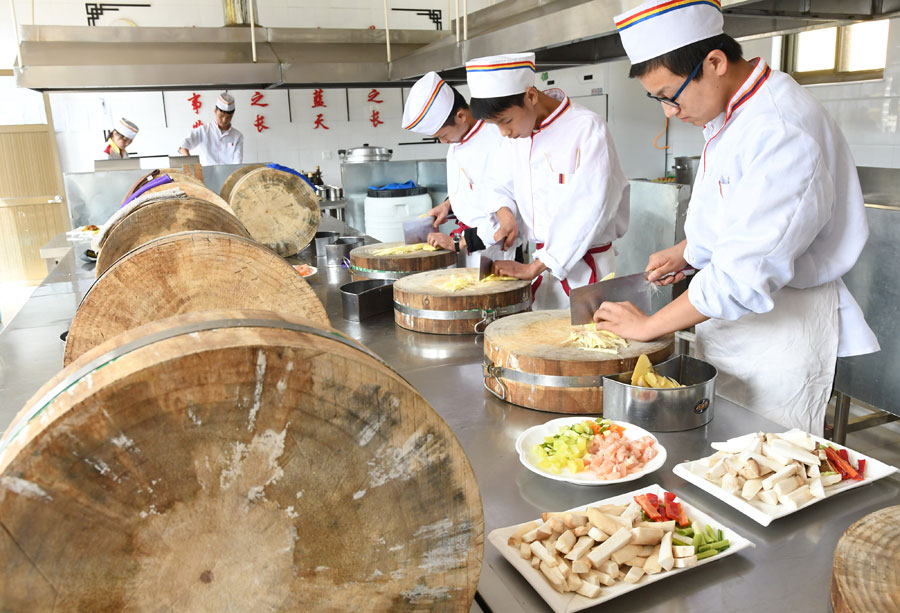
From the People's Daily app.
And this is Story in the Story.
The number of applicants to vocational schools has dropped each year since 2009, while the estimated shortfall of technicians is 22 million nationwide this year.
Yet statistics show that the employment rate of graduates from technical schools has been higher than that of college graduates since 2017.
In 2014, the Ministry of Education earmarked 600 colleges across the country to shift their focus from undergraduate education to vocational and technical education anticipating a nation-wide demand for skilled workers.
Today's Story in the Story looks at how China’s disposable income spenders are fueling demand for hairstylists and barbers because having just the right haircut is money well-spent.

Trainees learn culinary skills at a vocational school in Linxia county, Gansu province, as a part of the county's poverty alleviation efforts. (Photo: Xinhua)
Her hair wrapped in a plastic cap, 64-year-old Yang Shuxian settled into a chair in a bustling hair salon in downtown Beijing to get a perm for the Spring Festival, which falls on Feb 5 this year.
She had arrived at the salon, on Wangfujing Street, at around 7 am-two hours before it opened. But she was not attended to until supper time, just as she had expected.
"I would have to wait even longer in one or two days," she said. "The New Year is coming, and everybody wants to look smart while visiting their relatives."
Yang was just one of many Chinese pouring into hair salons to have their hair done ahead of Spring Festival, which is celebrated with family reunions and visits to friends and relatives to exchange New Year greetings.
Silian Hairdressing, a state-owned hair salon established in the 1950s that mainly caters to older customers, said it received more than 15,000 customers between Jan 1 and 25, a 25 percent increase over the same period last month.
It is also the case elsewhere and among other age groups.
Fan Haichao, a hair stylist with Beijing's Estyle salon chain, which is favored by 20-or 30-somethings, said working overtime was the norm during the month leading up to the Lunar New Year.
"I work from 9:30 am to nearly midnight these days," he said, adding his salon received an average of 80 customers a day in January, and up to 120 a day in the week before the Lunar New Year.
Gui Xiufeng, a hairdresser who started at Silian in 1980, said demand surges because people want to look their best at the beginning of the year, but a superstitious belief is also a factor.
A barber finishes a retro hairstyle for a customer at his barbershop in Shanghai on April 5, 2018. (Photo: IC)
Many Chinese hold the belief that having their hair cut during the first month of the lunar calendar will bring bad luck-even death-to their uncles on their mother's side.
"During the 1980s and '90s, you would see few customers until the second day of the second lunar month, which is known as longtaitou (dragon raises its head)," she said.
But folklore specialists say the superstition, dating as far back as the early Qing Dynasty (1644-1911), stems from a misinterpretation. When the Manchu-an ethnic minority inhabiting northeastern China-move southward and overthrew the Han-dominated Ming Dynasty (1368-1644), they ordered Han people to shave their heads.
But the Han, who regarded hair as an integral part of their familial heritage, like their blood and flesh, decided not to shave their heads during the first lunar month as a form of silent protest and a way to sijiu-remember their former rulers. Sijiu also sounds like the death of an uncle in Chinese, and that's why shaving the head gradually became a taboo during the first lunar month.
Gui said more people have recently been getting their hair cut early in the Lunar New Year.
"Ignoring the taboo is more common among young people, whereas those born before the 1980s are more traditional," she said.
Wang Ran, deputy general manager at Silian, said that as people get richer, they can get their hair cut whenever they want, instead of a few times a year, one of which was usually before the Spring Festival-the most important celebration for Chinese.
"But going to the hairdresser before the New Year has become a tradition for many, even if they can technically have the job done at any time of the year," she said.
(Produced by Nancy Yan Xu, Lance Crayon, Brian Lowe and Da Hang. Music by: bensound.com. Text from China Daily.)


